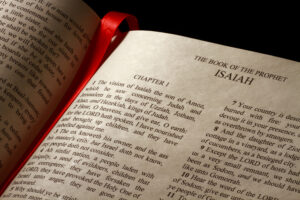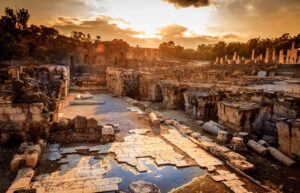Hebrew Prophets – Isaiah

I would invite you to explore the Old Testament prophets – the Hebrew prophets, who all have a book by their name in the Old Testament, and who all have something to say both in their historical context and also to us who live in an age where the second coming of the Lord Jesus is rapidly approaching.
This blog series will aim to give an overview of the prophets in the hope that it will encourage you to search for more. We will pose four questions regarding each prophet:
What do we know about their background?
What do they say about Israel?
What do they say about Jesus the Messiah?
How can we relate to these prophets on a personal level and in the times we live in?
The first prophet we would like to meet is Isaiah – Yeshayahu as he is called in Hebrew – which means Salvation is of the Lord. Isaiah is by far the most well-known and the most quoted prophet of the Old Testament. The book of Isaiah is like a mini-Bible containing 66 chapters out of which the first 39 have an emphasis on the history of the day, whereas the final 27 have a spiritual and prophetic focus. Because of a considerable difference in the two sections of the book, some scholars have held a view that there were two Isaiahs, but an overall consensus is not in support of that position.
Background

Isaiah lived at the time when the Assyrian army conquered the Northern Kingdom of Israel in 722 BC and scattered the ten tribes throughout the vast Assyrian empire. It was a time of political turmoil – a judgement of God for the unrepentant nation.
Isaiah was born into a royal family living in Judah, the son of Amoz who is traditionally thought to be a prophet, as well. We know that Isaiah had two sons, Shear-Yashuv (Isaiah 7:3) and Maher-Shalal-Hash-Baz (Isaiah 8:3). As it was common in biblical times, both names are prophetically significant. Shear-Yashuv means a remnant shall return, referring to a future restoration and salvation of Israel; Maher-Shalal-Hash-Baz means swift to plunder and quick to carry away which is what the Assyrian king was doing at the time of the boy’s birth.
Isaiah lived in Jerusalem and received visions from the Lord under the reign of four kings of Judah – Uzziah, Jotham, Ahaz and Hezekiah. His ministry lasted for 50 years from about 740 to 690 BC. He counselled King Ahaz and King Hezekiah not to make alliances with foreign kings but to trust in God alone. When the Assyrian King Sennacherib wanted to lay siege on Jerusalem, it was Isaiah who brought messages from God to King Hezekiah about the failure of the plan (Isaiah 36, 37).
Isaiah was privileged to see a vision of the heavenly throne room (Isaiah 6), very similar to the visions given to Ezekiel (Ezekiel 1) and the Apostle John (Revelation 4, 5). The Lord Himself spoke to these prophets and, with Isaiah and Ezekiel, explained their calling and launched them into their ministries. No doubt, such a powerful encounter had a lifelong impact on the mission of these prophets.
Jewish tradition says Isaiah was killed during the reign of the evil King Manasseh, the son of King Hezekiah, who had him sawn in two. Hebrews 11:37 alludes to this kind of death, which the faithful of God had to go through while staying true to their mission.
What does Isaiah say about Israel?
Like most of the Old Testament prophets, Isaiah’s primary calling was to warn the people of Israel of their sins and challenge them to follow their God.
Wash and make yourselves clean.
Take your evil deeds out of my sight;
stop doing wrong.
Learn to do right; seek justice.
Defend the oppressed.
Take up the cause of the fatherless;
plead the case of the widow. Isaiah 1:16-17
As Israel is failing to do that, judgement is sure to follow. God will send foreign nations to oppress them and to bring destruction to the land and the people. Most of the prophecies by Isaiah (and by other prophets) in that regard are dual in nature. They start off with the immediate historical situation but develop into something much wider, the fulfilment of which has been happening throughout history and is still to happen.
God loves His people, Israel. He does not want to judge them, but His justice and holiness demand the judgement. However, together with the warning of judgement, God gives them hope of restoration:
- He promises to gather Israel from all the countries He has dispersed them (Isaiah 11:11-13; 43:5-7; 60:8-10)
- He calls pagan nations to assist Him in regathering Israel (Isaiah 49:22)
- He promises to restore the land (Isaiah 35; 49:8; 66:8-9)
- He comforts His people and calls them compassionately to Himself (Isaiah 40:1-2; 43:1-3; 44:1-54:7-10)
- He tells of the future glory and magnificence of Jerusalem (Isaiah 2:2-3; 25:6-8; 29:5-7; 52:1-8; 54:11-17; 60; 62)
- He speaks a lot about the Messiah who will bring deliverance to Israel and the whole world.
What does Isaiah say about the Messiah?
Isaiah provides the most comprehensive prophetic picture of Messiah Jesus – Yeshua HaMashiach – from the announcement of His coming:
Therefore the Lord himself will give you a sign: The virgin [Almah in Hebrew, which means ‘a young girl’] will conceive and give birth to a son, and will call him Immanuel [God with us in Hebrew]. Isaiah 7:14
To His everlasting reign:
For to us a child is born,
to us a son is given,
and the government will be on his shoulders.
And he will be called
Wonderful Counsellor, Mighty God,
Everlasting Father, Prince of Peace.
Of the greatness of his government and peace
there will be no end.
He will reign on David’s throne
and over his kingdom,
establishing and upholding it
with justice and righteousness
from that time on and forever.
The zeal of the Lord Almighty
will accomplish this. Isaiah 9:6-7

Altogether there are 44 mentions by Isaiah about the Messiah that are very detailed. We must bear in mind that Isaiah prophesied about 700 years before the birth of Jesus, which makes this really remarkable. The best-known scripture about the suffering of the Messiah is chapter 53 – known to most Christians and quoted often at Good Friday services. We can only be amazed at the detail that Isaiah gives about what the Messiah had to go through to pay the penalty for our sins:
Surely he took up our pain
and bore our suffering,
yet we considered him punished by God,
stricken by him, and afflicted.
But he was pierced for our transgressions,
he was crushed for our iniquities;
the punishment that brought us peace was on him,
and by his wounds we are healed. Isaiah 53: 4-5
He was oppressed and afflicted,
yet he did not open his mouth;
he was led like a lamb to the slaughter,
and as a sheep before its shearers is silent,
so he did not open his mouth. Isaiah 53:7
Unfortunately, these scriptures are not understood by the majority of the Jewish people. One reason is that they are left out of the regular Shabbat readings in the synagogues. Rabbis throughout centuries have not come to an agreement about these verses, many thinking that they refer to Israel as a suffering nation. However, the plain reading of the text makes it quite clear that it speaks of a singular person. God has allowed blindness to be over these verses for Jews for a long time, but – glory to God – this blindness is gradually lifted. I have heard many testimonies of how a Jewish person has been drawn to read those verses after which they have received a revelation of Yeshua as the one depicted there.
Throughout the book of Isaiah, God reveals that Jesus will come to earth first as a human to deal with sin and then again in His glorified state after being resurrected from the grave to establish the Kingdom of God. Not understanding the dualism of the Messiah’s coming is another reason why many Jews rejected Him during His first coming: He did not fulfil the prophecies of ruling over the earth and establishing an eternal government, which will occur during His second coming (Isaiah 9:6-7; Isaiah 40:10).
How can we relate to Prophet Isaiah on a personal level and in the times we live in?
I don’t think it’s an exaggeration to say that Isaiah is one of the favourite Bible books to quote from and apply on our personal walk with the Lord. In times of trouble and while standing in faith we hold fast to verses like these:
You will keep in perfect peace those whose minds are steadfast, because they trust in you.
Trust in the Lord forever, for the Lord, the Lord himself, is the Rock eternal. Isaiah 26:3-4
Say to those with fearful hearts, “Be strong, do not fear; your God will come, he will come with vengeance; with divine retribution he will come to save you.” Isaiah 35:4
He gives strength to the weary and increases the power of the weak. Even youths grow tired and weary, and young men stumble and fall; but those who hope in the Lord will renew their strength. They will soar on wings like eagles; they will run and not grow weary, they will walk and not be faint. Isaiah 40:29-31
When you pass through the waters, I will be with you; and when you pass through the rivers,
they will not sweep over you. When you walk through the fire, you will not be burned; the flames will not set you ablaze. Isaiah 43:2
Remember the former things, those of long ago; I am God, and there is no other; I am God, and there is none like me. Isaiah 46:9
No weapon forged against you will prevail, and you will refute every tongue that accuses you. This is the heritage of the servants of the Lord, and this is their vindication from me,”
declares the Lord. Isaiah 54:17
These scriptures and many others confirm to us the unfailing love and care of our God. He will not leave us whatever may happen. He strengthens us and gives us hope for the future – especially as we live in turbulent times and, if we believe what the Bible says, the times are not getting easier.
Isaiah is one of those prophets who speaks about the Day of the Lord. This is a time of awesome and frightening events leading to the return of Jesus. Many people think of it as “the end of the world,” although it is really just the end of this present evil age. I am not going into much detail about it as I don’t have enough understanding of how it will unfold. Suffice it to say that the imagery of Isaiah is very similar to that of the Books of Daniel and Revelation. The evil of this present age will be dealt with, and the Messiah’s Kingdom established with the headquarters in Jerusalem. We can get a glimpse of this upcoming era in scriptures like this:

“Never again will there be in it an infant who lives but a few days, or an old man who does not live out his years; the one who dies at a hundred will be thought a mere child;
the one who fails to reach a hundred will be considered accursed. They will build houses and dwell in them; they will plant vineyards and eat their fruit. No longer will they build houses and others live in them, or plant and others eat. For as the days of a tree, so will be the days of my people; my chosen ones will long enjoy the work of their hands. They will not labour in vain, nor will they bear children doomed to misfortune; for they will be a people blessed by the Lord, they and their descendants with them. Before they call I will answer; while they are still speaking I will hear. The wolf and the lamb will feed together, and the lion will eat straw like the ox, and dust will be the serpent’s food. They will neither harm nor destroy on all my holy mountain,” says the Lord.
Isaiah 65:20-25
God bless you.
Click here to change this text
